Robert Babicz has been involved in music for around 25 years now. He’s seen the industry when it was in its infancy and watched it evolve into the bustling global community that it is today. His music is known the world over, but for our chat, I wanted to concentrate on the world inside Robert Babicz’s mind. Before our interview, I got a strong sense that he‘s a man who thinks deeply and philosophically about his craft. I could tell that he has a good message to send out to the world.
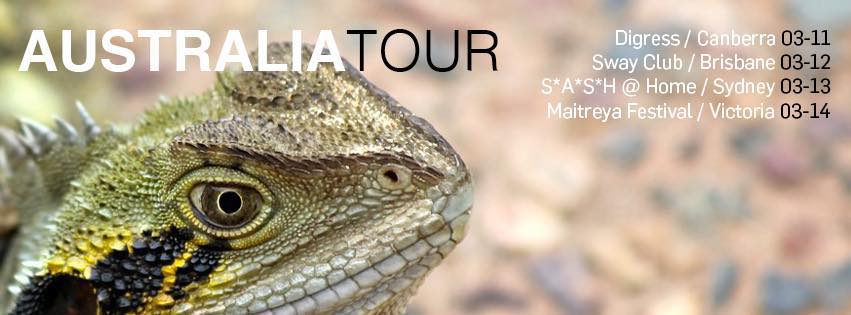
Before he’s set to touch down to Australia, I wanted to gauge some perspective from Robert in regards to an issue that’s quite tender right now, the lock out laws. Having asked him what he has heard about the laws, Robert said:
“I heard about it from seeing a few status lines on Facebook from friends I met over the years in Australia…You know, a few years ago I thought that when I become old, I want to move to Australia; because it’s such a beautiful country and the people are so free and it’s so nice…Now I’m mature” he says with a slight laugh.
“For me, I had the feeling that, at least at the airport, that the government is constantly telling you what to do; what’s right and what is wrong; like constantly hearing voices (over the loudspeaker) saying ‘do this’, ‘don’t do this’“ said Robert in a pitched down, big brother style voice. “…I thought okay, maybe it’s just at the airport and not the case when you live there. But now with the lock out laws…I’m not so sure anymore“.
I was slightly taken back by his reactions. This is the kind of status that the city has these days, to the point where people from overseas second guess the nature of the controlling powers of the state. It seemed like it had slightly tainted the memories that Robert held dear to him.
Still, Australia is a place that Robert holds close to his heart, especially the city of Melbourne.

Above: Robert’s photography.
“With every Australian tour I go on, one of the super highlights that I look forward to every year is coming to Melbourne”. He plans to stay in Melbourne after his tour before heading home to indulge his other passion, photography. “In Melbourne, you never know. It can be great one day and then rain like hell the next!“ he said with a chuckle. “But, both cities, in their own way, are really cool”.

Above: Robert’s photography from his Australian adventures.
I wanted to know where Robert’s musical journey begun. Over a few years of pondering the questions himself and searching his mind, he was able to put it down to a few key points.
“…when I was around nine years old, I had an my own little radio player device, and one day I heard a radio show with just pure electronic music, no beats, no percussion or anything. Just sounds. It was a special radio show that was just for ambient, spatial music. After a few minutes, I had the feeling that I’m not listening to music, but some kind of alien communication. I thought ‘wow, I’ve really got a radio station from another galaxy’!”
“I got really afraid; I was going under the pillows thinking ‘AHHH!’. I almost started to cry, but at the same time was thinking that this music is sooooo cool! This was really a key moment for me”.
Robert came to Germany from Poland at the age of four. Coming from a simple working class family, art and especially music was played no role in his or the family’s life. Robert commented that he felt “very alone” from this absence. It was if he had the music inside him but didn’t know it yet.

Above: Robert’s Photography
During his teen years, he experienced house music for the first time. “It got more and more interesting when they (the DJ’s and artists) left out vocals, when the music went more instrumental. I started to like this kind of abstract way of music”.
Further again down the line, Robert got his first taste of futuristic acid house. “I had almost the same feeling of, wow, this is not ending, this is alien! For me, this is when things got crazy. I loved it! The music was slow and super abstract; strange music. I had no idea about all these news sounds, I was just a listener”.
During the early nineties, Robert was playing around on a Commodore Amiga. Computer’s had taken his interest as he thought that this is something that he would follow in life. He never thought at this stage that we would be an artist or a musician still. “I was really a nerd and very shy. If at that time someone were to say that you’ll be standing in front of 100,000 people, I would have never believed them. I wasn’t even able to stand up in front of my class. I was really a nerd.”
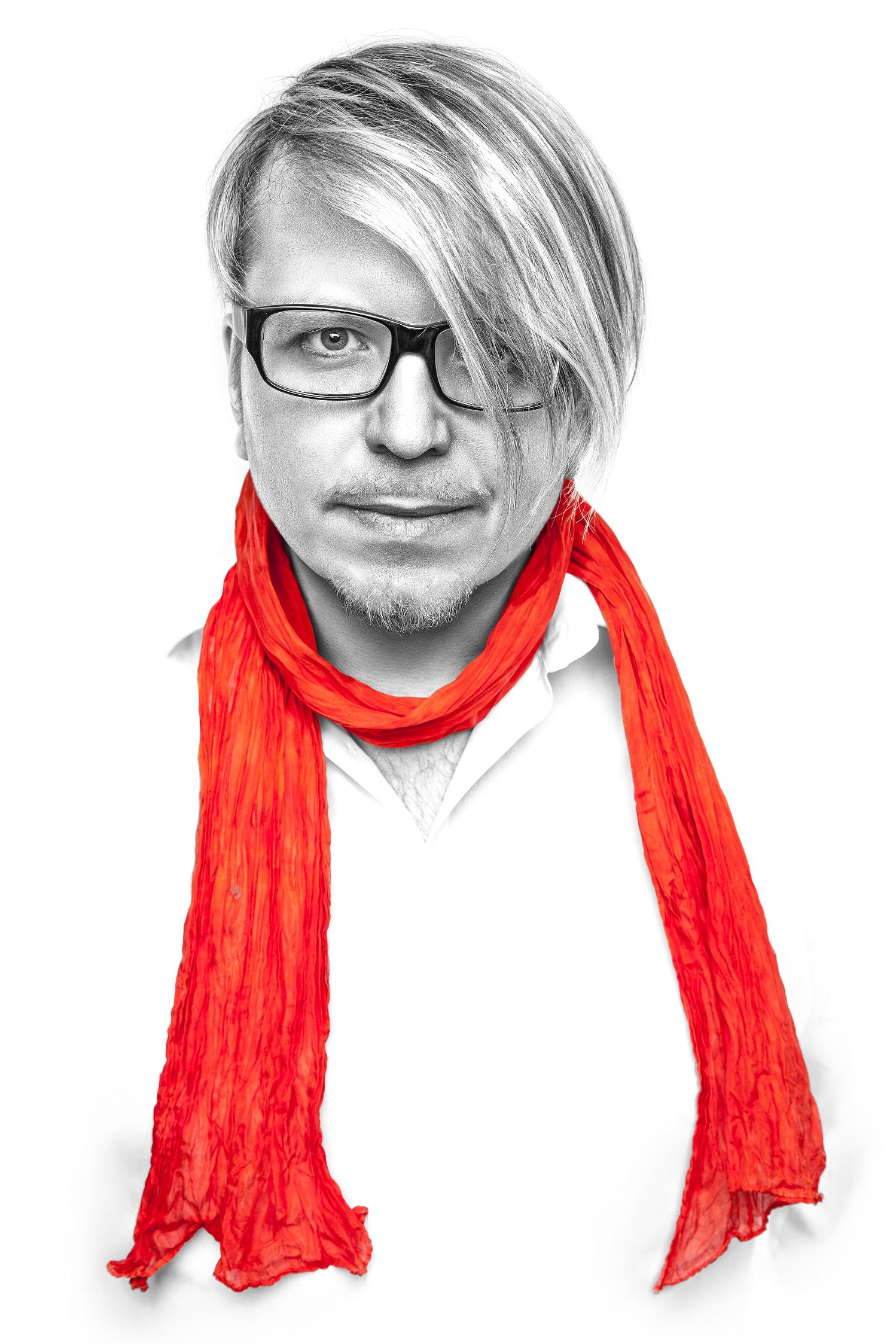
“A friend of mine lent me some music equipment one time as he was going on a holiday. I said of course!!! I really had no idea about synthesizers or drum machines at all, but I was curious. I liked the buttons and knobs; the sounds coming out…in the end I was able to connect everything and make music without knowing what I was doing. I had lots of fun doing this”.
Even after this experience, music was still something Robert didn’t know he was going to follow. “I had no clue what I was doing, I just had fun. I recorded a few tracks on a cassette from these sessions. I don’t know why, but I saw an advertisement in a magazine from a young record label looking for electronic music. I sent in the cassette. A few days later I got a call from the label saying ‘wow, this is so cool! We have to release it! Send in the masters please!’…and I told them, ‘you have the masters in your hands. The only copy I have, you have it in your hands’! This was my first release; they pressed vinyls out of this cassette”.
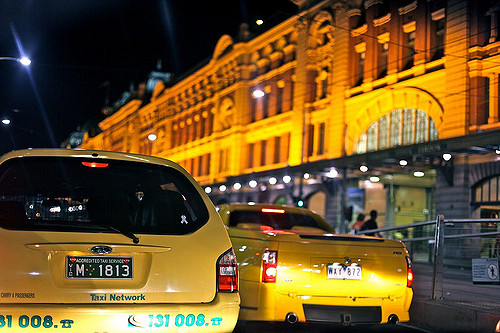
Above: Rorbert’s Photography
Although having a release out, the big key moment for his career was yet to come. Right after Robert’s first record, around the last six months of his high school life, a club promoter called him up after the headliner for their night couldn’t make it in. Robert had been given the task of replacing his slot. One problem…he didn’t own any gear. But what would you do if you where in his position…of course you would say yes!
Thankfully, the promoter organised gear for Robert to use on the night. “They gave me a drum machine, two synths and a mixer. I went there two hours before the show to see the instruments for the first time in my life. I had no clue! I just programmed some patterns and sounds and tired to understand the equipment”.
“I, again, had no clue what I was doing but I had fun! It was super cool. I played for over one hour, just improvising patterns and sounds. The people went mad. For me, it was the first time in my life that I thought ‘maybe, this is why you were born’. It was a very, very deep thing, coming out of my heart’. This was the moment for Robert, he know what he wanted to do.
His parents were shocked at Robert’s choice to be an artist. Having no concept of music, they couldn’t understand his choice. They gave him an ultimatum, stay at home and find a working job, or move out if you want to follow music. He, of course, followed the latter. “I was super stubborn. I knew that I had to fight for this. I found a little room and things were moving at quite a pace. I got a few shows, and from that money to buy some cheap second hand equipment”.
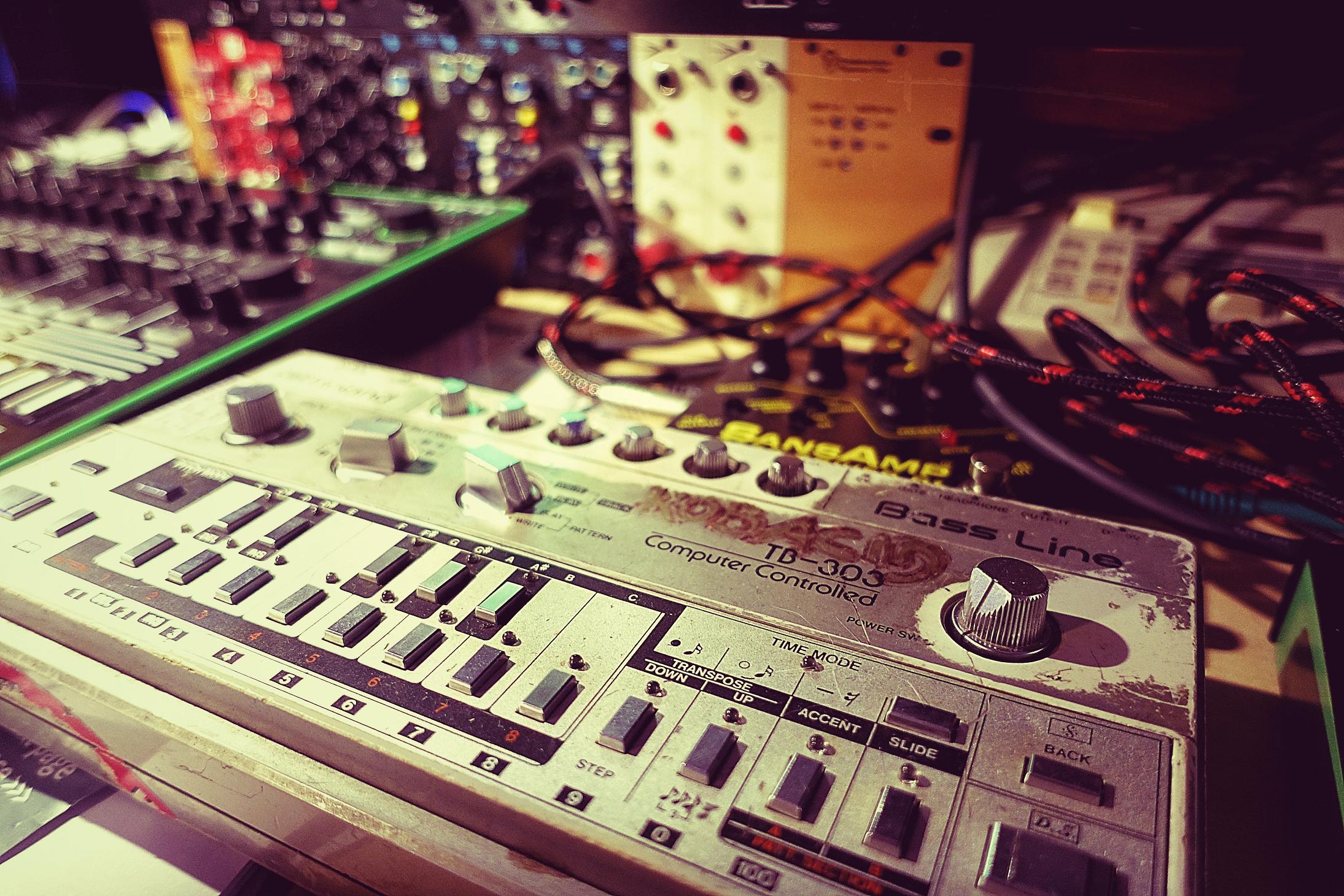
Above: A worn out TB-303. Robert is adamant that you need to “fuck your equipment” when you play.
“Whatever happens, I will not stop this. I will fight for this. The first years were hard. You get a little bit of money and you have to decide, do I go to the shop and buy food or do I go to the music shop and get equipment!? I was eating a lot of noodles and the cheapest food possible!”
From those days, Robert has come quite far. He now has his own mastering facility where he works on his and his client’s music. Apart from listening to his client’s music, he doesn’t listen to other’s music apart from his own. Robert thinks deeply about his music and explores that on an emotional level. He’s about discovering and letting out the sonic that comes from his heart.
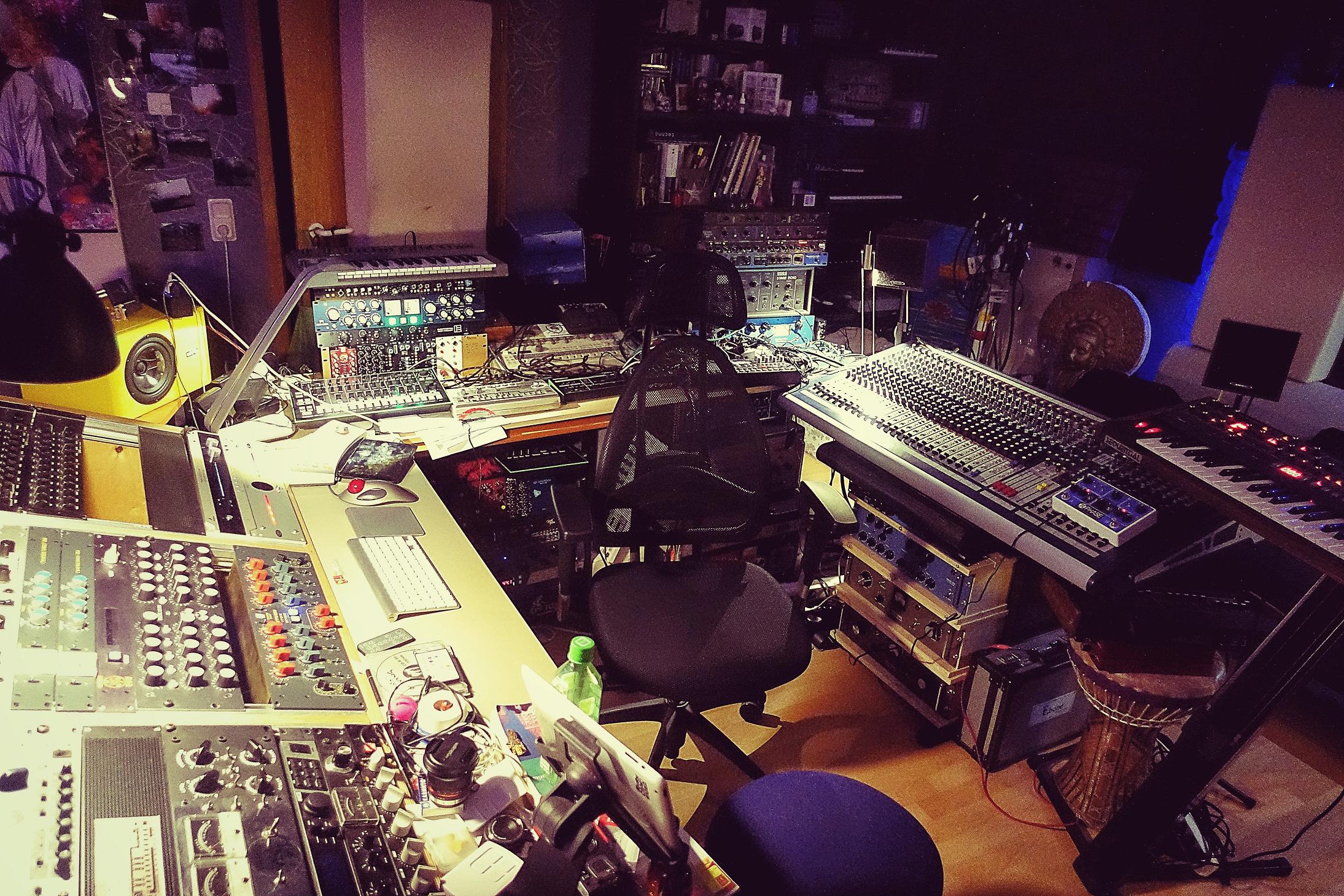
Above: Robert’s studio/mastering facility filled with a vast range of tools.
I shot him a few of my own productions to gauge some feedback on how they sound in his studio. The most important thing he said to me is that it sounds like I’m making music for someone else. This resonated deeply with me. Exploring one’s full potential comes with exploring one’s self, and therefore making music for you alone.
“I found out something a few years ago. One thing I really like to do is going for a walk in the forest, being alone and connecting with nature. It’s kind of like meditation. And from this, I understood that I have music very, very deep inside myself. The more that I wasn’t listening to music from other people; the more I was listening in from music that was coming from my heart”.
“I love music from others of course! There are really amazing artists out there, but I just thought to focus on this (himself) and try and find out what you have inside”.
Robert has synaesthesia, a neurological phenomenon where stimulating one cognitive or sensory pathway in the brain stimulates another. This is to say, Robert can visualise sound and hear imagery. His vast array of gear and quality monitoring system is used as tools to excite his connected scenes, not just a fancy collection. The way he describes this is quite poetic.
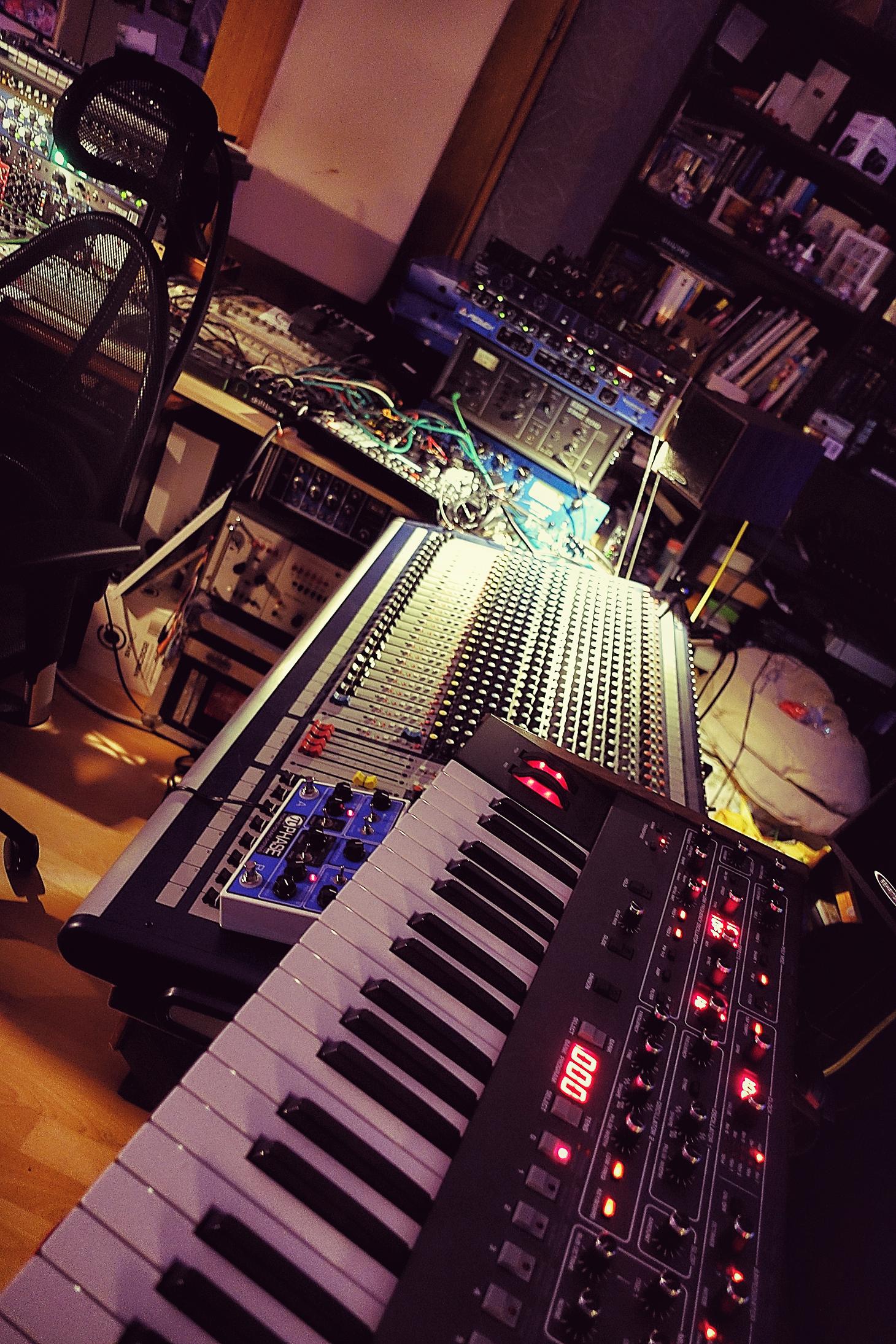
“My DAW program on the computer; it’s like an empty three dimensional theatre stage. I start to bring in sounds and every sound is an actor on this stage and is doing something. You have interactions between the sounds. You have actors at the front of the stage and actors at the back. You have left and right, and up, you have down; and then there are stories happening. You have men and women meeting and they’re kissing, and making children. You have groups colliding and fighting! You have drama! For me, I see these very alive movies in my head”. Wow. I feel like this is an ability that every producer would wish to have.
Errors in track are seen as errors in geometry. Things that don’t work well in tracks, Robert can see and remove from the stage movement that’s going on in his head. This is why he tells people, “Every sound should have a reason. If a sound has no reason, why should it be inside the music?”
Being a mastering engineer, I was deeply curious to pick his mind about a few topics, such as mix down and dynamics. It must be stated that I have a gripe with modern music, and that a lot of new producers may overlook the importance of dynamics and a proper mix down. The plight of the modern day music market is loudness. Loudness is somehow seen as a sonic quality that is good, but it ruins the beating heart of the track, its dynamics which gives a piece of music individuality. Music is over compressed, loud, and un-dynamic.
Young producers are being brought up on this assumption that loudness is good. How wrong.
Speaking about the past, Robert said “When you went to shopping centres, you would find hi-fi shops with hi-fi equipment, with big speakers systems. It was about what kind of amp you had and all these things. These days if you go out, you find small mobile speakers for your mobile phone as the main music consumption. That shows me that sound quality is really not important for people anymore. It’s like music and sounds have lost its place that it had before.”
“In the end, quality has a longer life. I see it with my own music. If you really take care of your mix down and your songs in general, they will be timeless. They will work forever and they will sell for a long, long time…”.
I asked Robert how he would explain the purpose and meaning behind dynamics to a younger generation of producers. He said “…again I can explain it with a kind of picture. If everything is loud, then everything is almost like silence. There is nothing, if I don’t have enough room between loud and silence, then everything is just loud…it’s just nothing”.
“Imagine someone gave you a Ferrari, brand new and super cool…” he laughs. “But this Ferrari doesn’t have windows. You just have one small hole and the rest is just wood. Then they tell you that you have to go into a race and you have to win…So you just have a little hole in the wood to see through. You don’t see the streets, you don’t see the other cars, and you don’t see how you can drive the car at 320 km/h. It’s the same with music, if you aren’t able to hear what’s going on, how can you win the race? My biggest tip would to go out and buy the best speakers or headphones with your money. Being able to hear better is like widening the hole in the Ferrari until you can see clearly. Then hopefully, you can go out and buy a REAL Ferrari”.
For producers, trying to get a piece of music to sound as good as possible requires time. Lots and lots of time. Having done it myself for around 6 years now, I feel like I’ve only started to get the hang of it. Robert is chasing perfection. He’s like a top class Japanese sushi chef, always striving and driving until he thinks he’s got it right. “After 25 years of experience, I’m now an advanced beginner”.
Having been in the industry for 25 years now and seeing the exponential expansion of electronic music, I asked Robert what gets him most excited about the future of the music culture he’s involved in. “At this moment, it’s really exciting that this electronic music we listen to works everywhere on this planet, and I can tell you because I’m travelling all the time. All continents, All religions. All societies; from deep Siberia to the deserts of Australia. From Africa to Asia. Everywhere. This music is connecting people, it’s making people happy. To listen to pop music, you have to understand English. With this music, you understand just by moving your body; by dancing to it…”.
“…what makes me really happy is when I see people on the dance floor; they are forgetting where they are. They just dance their arse off, they get crazy. There is a certain smile on their face where they just forget everything, and live right there in the moment. It’s almost spiritual in a way that it’s this moment of awareness, of being here, because you’re really alive. It’s now. It’s not one second later, one second ago, it’s now. You don’t care about all your problems; you’re just focused in this moment. You feel the sound punishing you. You get fucked by the sound but you’re so alive in this moment…”
“I always say I’m not playing a set, what I’m doing is a magical ritual. I’m not a musician on the stage; I’m someone who has the position to control this ritual, to give opportunities to people. I’m offering! And it’s up to the people to take it. Again, I’m producing this stage with actors, but they’re placeholders. You fill in the story yourself. I’m just offering a scene and you just put yourself into it. You’re the main actor in all of them.”
I think these are words that any producers, especially the younger generation should reflect on. Robert has seen the music world go from a small community to a thriving global network, but things move very fast these days. To some, trying to keep up with what people want is all that matters. More thought could easily be put into one’s self and the music they make. Electronic music has always been about making the sounds of the future, and not about making the sounds of today. Electronic music culture in Australia is quite young however, but thriving. I feel like the next generation could take a word of advice from Robert and his thoughts.
Tour Dates:
Digress / Canberra 11-03-2016
Sway Club / Brisbane 12-03-2016
S*A*S*H @ Home / Sydney 13-03-2016
Maitreya Festival / Victoria 14-03-2016
Words: Fergus Sweetland

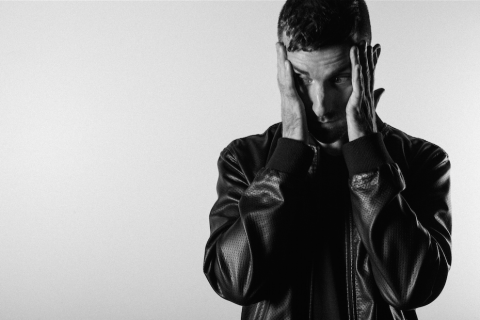

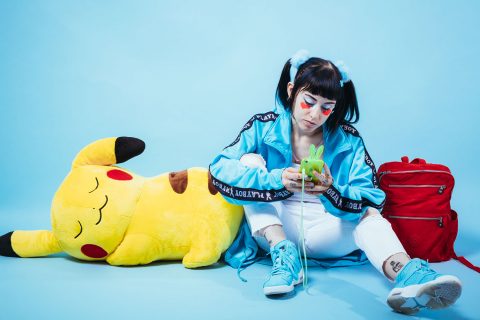
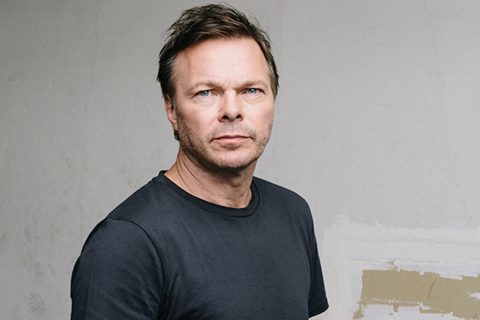
Comments